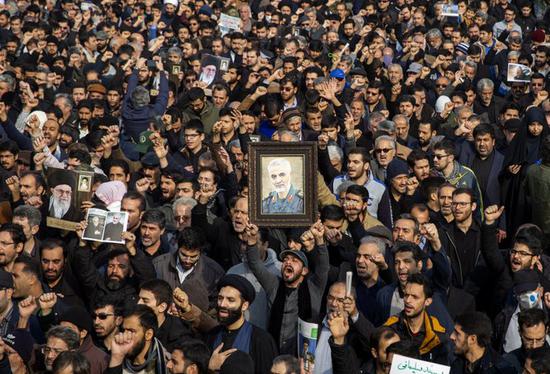Killing seen as blow to Iran's clout in region
The killing of Qasem Soleimani, Iran's top general of the elite Quds Force of the Islamic Revolutionary Guard Corps, in a drone strike by the United States on Jan 3, will inevitably provoke retaliation from Iran.
The assassination has also enraged the Iranians. Soleimani was the key architect of Iran's regional influence, a national hero, a power broker of the Shiites, a military strategist in fighting terrorism and a confidant of Ayatollah Ali Khamenei, Iran's supreme leader, who fondly called him "a living martyr".
Soleimani's death will undermine Iran's regional influence. His Quds Force focuses on overseas operations like collecting intelligence and developing and managing proxy militias. It has been a main vehicle for Iran to cultivate Shiite militias in the Middle East.
For instance, Iran has been backing and funding overseas anti-American and anti-Israeli forces, including Bashar Assad in Syria, Hezbollah in Lebanon, Houthi in Yemen and Popular Mobilization Forces in Iraq. Sometimes, it has even orchestrated their activities.
Killing the top brass of a nation is an act of aggression. The U.S. has flagrantly violated international law by eliminating Soleimani, a move that could possibly trigger a war.
The U.S. took out Soleimani amid the escalated U.S.-Iran confrontation. The Pentagon has identified Iranian-backed Hezbollah militia as the culprit behind the Dec 29 attack on a U.S. facility in the Iraqi city of Kirkuk that killed a U.S. contractor. In retaliation, the U.S. launched airstrikes on three Iran-backed militia bases in Iraq and Syria, killing 25 militia fighters and injuring 50.
The attacks sparked a wave of protests in Iraq. On Dec 31, thousands of Iraqis stormed the U.S. embassy and vandalized property. The U.S. suspects Teheran's role in the embassy siege.
Amid the growing U.S.-Iran conflict, the killing of Soleimani has served two purposes. First, it has sent a strong message to Iran. Second, it has curtailed the regional clout of Iran. The killing also sends a warning to Iraq, which is a close ally of Iran. The U.S. believes that without a mastermind like Soleimani, Teheran cannot hold sway over the region as it used to.
The order to kill Soleimani was spurred on by Iran hawks in the U.S. administration. The U.S. and Iran have been on a near collision course for years, but both sides are aware of the high price of a war. That is why the previous administrations in the U.S., led by George W. Bush and Barack Obama, resorted to isolation, sanctions and embargoes, and any U.S.-Iran military confrontation has been limited to proxy wars.
Trump has been withdrawing from the hot spots of Syria, Iraq and Afghanistan. Maybe this time he heeded counseling by his advisers to execute Soleimani, who had many Americans' blood on his hands and was plotting another attack against the U.S.. Killing him was a preemptive move, according to some U.S. officials.
Iran will seek revenge because it needs to show a hard stance to the international community and the aggrieved Iranians. The killing of Soleimani will give Iran a rational cause to go to war with the U.S.. In addition, it could plunge the entire Middle East into a war.
While the U.S. has unrivaled military strength, Iran has unique geopolitical advantages in asymmetric warfare. Pro-Iran forces in Lebanon, Syria, Yemen, Iraq and Palestine can pose a serious threat to the U.S. military bases and diplomatic agencies in the Middle East, as well as to Israel.
Zou Zhibo is vice-director of the Institute of World Economics and Politics of the Chinese Academy of Social Sciences. The views do not necessarily reflect those of China Daily.

